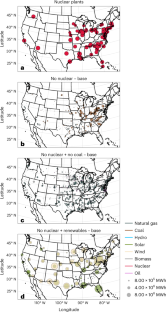2023-04-10 マサチューセッツ工科大学(MIT)
米国には世界最大の原子力発電所があり、その多くが期待される寿命を迎えつつある。政策立案者は、老朽化した原子炉を引退させるか、それとも原子炉の構造を強化して原子力発電を継続するかについて議論しています。
この原子炉は、気候変動を引き起こす石炭、石油、天然ガスに代わる低炭素エネルギー源として多くの人が考えています。
<関連情報>
- https://news.mit.edu/2023/study-shutting-down-nuclear-power-could-increase-air-pollution-0410
- https://www.nature.com/articles/s41560-023-01241-8
原子力発電の段階的廃止は、米国の大気質と気候関連死亡リスクを再分配する Nuclear power generation phase-outs redistribute US air quality and climate-related mortality risk
Lyssa M. Freese,Guillaume P. Chossière,Sebastian D. Eastham,Alan Jenn & Noelle E. Selin
Nature Energy Published:10 April 2023
DOI:https://doi.org/10.1038/s41560-023-01241-8

Abstract
We explore how nuclear shut-downs in the United States could affect air pollution, climate and health with existing and alternative grid infrastructure. We develop a dispatch model to estimate emissions of CO2, NOx and SO2 from each electricity-generating unit, feeding these emissions into a chemical transport model to calculate effects on ground-level ozone and fine particulate matter (PM2.5). Our scenario of removing nuclear power results in compensation by coal, gas and oil, resulting in increases in PM2.5 and ozone that lead to an extra 5,200 annual mortalities. Changes in CO2 emissions lead to an order of magnitude higher mortalities throughout the twenty-first century, incurring US$11–180 billion of damages from 1 year of emissions. A scenario exploring simultaneous closures of nuclear and coal plants redistributes health impacts and a scenario with increased penetration of renewables reduces health impacts. Inequities in exposure to pollution are persistent across all scenarios—Black or African American people are exposed to the highest relative levels of pollution.



